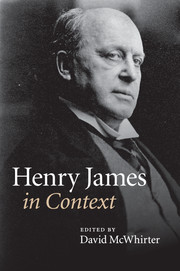Book contents
- Frontmatter
- Contents
- List of Illustrations
- Notes on Contributors
- Preface
- Abbreviations
- Chronology
- Part One Life and career, times and places
- Part Two Historical and cultural contexts
- Chapter 9 Aestheticism and Decadence
- Chapter 10 Authorship
- Chapter 11 Children
- Chapter 12 Consumer culture
- Chapter 13 Cosmopolitanism
- Chapter 14 Courtship, marriage, family
- Chapter 15 Ethics
- Chapter 16 Language
- Chapter 17 Law
- Chapter 18 Manners
- Chapter 19 Media and communication technologies
- Chapter 20 Modernism
- Chapter 21 Money and class
- Chapter 22 Museums and exhibitions
- Chapter 23 Nationalism and imperialism
- Chapter 24 Print culture
- Chapter 25 Psychology
- Chapter 26 Race
- Chapter 27 Realism and naturalism
- Chapter 28 Sexualities and sexology
- Chapter 29 Social sciences and the disciplines
- Chapter 30 Things
- Chapter 31 Time
- Chapter 32 Travel and tourism
- Chapter 33 Urbanity
- Chapter 34 Visual culture
- Chapter 35 Women and men
- Chapter 36 Work
- Part Three Reception
- Further reading
- Index
- References
Chapter 23 - Nationalism and imperialism
Published online by Cambridge University Press: 05 August 2014
- Frontmatter
- Contents
- List of Illustrations
- Notes on Contributors
- Preface
- Abbreviations
- Chronology
- Part One Life and career, times and places
- Part Two Historical and cultural contexts
- Chapter 9 Aestheticism and Decadence
- Chapter 10 Authorship
- Chapter 11 Children
- Chapter 12 Consumer culture
- Chapter 13 Cosmopolitanism
- Chapter 14 Courtship, marriage, family
- Chapter 15 Ethics
- Chapter 16 Language
- Chapter 17 Law
- Chapter 18 Manners
- Chapter 19 Media and communication technologies
- Chapter 20 Modernism
- Chapter 21 Money and class
- Chapter 22 Museums and exhibitions
- Chapter 23 Nationalism and imperialism
- Chapter 24 Print culture
- Chapter 25 Psychology
- Chapter 26 Race
- Chapter 27 Realism and naturalism
- Chapter 28 Sexualities and sexology
- Chapter 29 Social sciences and the disciplines
- Chapter 30 Things
- Chapter 31 Time
- Chapter 32 Travel and tourism
- Chapter 33 Urbanity
- Chapter 34 Visual culture
- Chapter 35 Women and men
- Chapter 36 Work
- Part Three Reception
- Further reading
- Index
- References
Summary
Henry James produced a large body of work during dramatic changes in Euro-American imperialism. Much of his work deals centrally with characters, situations and settings in which these changes have immediate relevance. As a cosmopolitan author who wrote centrally about the international theme, was born and raised primarily in the United States, lived most of his adult life in Europe, and in 1915 gave up his US citizenship to become a naturalized British subject, James was profoundly influenced by modern transnationalism. Until recently, however, scholars have not devoted central attention to his work in the context of the several imperial nations competing for power between the Civil War and World War I. Of course, many scholars have commented on James’s references to important events in modern imperial history, but most focus on how he incorporated contemporary news into his fiction, rather than on James’s political views of such events.
Throughout the nineteenth century British and US nationalisms often invoked imperial Rome to justify their expansionist ventures. Neoclassical architecture flourished in both nations, especially in the design of state buildings and monuments. Much as the Roman Empire suggested ancient glory and the success of a well-ordered, albeit brutal, state, it was also a reminder of failure. Edward Gibbon’s The History of the Decline and Fall of the Roman Empire (1776–88) was read in Victorian and nineteenth-century US schools, and his account of planning this great, multivolume work during a tour of Italy in 1764, while ‘musing amidst the ruins of the Capitol’, was often imitated by artists and intellectuals wishing to understand the message of ancient Rome’s fall.
- Type
- Chapter
- Information
- Henry James in Context , pp. 246 - 257Publisher: Cambridge University PressPrint publication year: 2010



